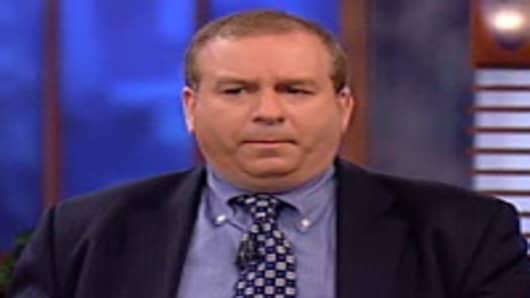If the bull market will end when the last grizzled bear comes out of his den and comes to the table, then hold onto your portfolio, because it may well be dinnertime.
David Rosenberg, the curmudgeonly senior strategist and economist at Gluskin Sheff in Toronto, told clients Wednesday in his daily newsletter that he’s finally given up his long-held position that the market is heading for a thud, if not an all-out crash.
Even as the major averages have risen 90 percent off their March 2009 lows, Rosenberg hasn’t been convinced, arguing that the economy is still too weak and investor sentiment way too giddy to justify such a relentless rally.
No more.
“This is not about throwing in the towel,” he writes, “it is an acknowledgement of what the market internals are flashing at the current time from a purely tactical and technical standpoint.”
For more than two years now Rosenberg has been advising clients not to trust the rally, defending bonds against “inflationistas” and warning that deflation remains the far greater danger.
But he now marvels—somewhat incredulously, to be sure—at how investors are dispelling concerns over downward GDP revisions, soaring commodity prices, supply disruptions after the Japan disaster and looming European debt default risks.
“The (US dollar) is on a one-way ticket south and so far has been orderly—will that be sustained is anyone’s guess,” he writes. “For now it is being viewed as fodder for the global liquidity and risk-on trades.”
The dollar actually traded flat at mid-day Wednesday, reflecting market ambivalence ahead of the first-ever Ben Bernanke post-Fed meeting news conference. But the greenback’s plunge consistently has been met with higher stock prices.
Rosenberg says he is still “nervous” about the US consumer, whose weakness in the wake of the credit collapse hasn’t bothered Wall Street investors much. He also makes an argument about Chinese inflation and equity weakness there.
But mostly, he sees the market trending toward an “important technical signpost” which he says is a “Holy Grail” that entails “new highs led by higher volume.”
Trading activity on the New York Stock Exchange remains weak, though he cites the Nasdaq rally Tuesday on volume above its 50-day moving average as a bullish indicator. He says the tech index activity “is a clear sign that the big boys are putting money to work,” although it would be hard to make an argument that it’s been anyone but the “big boys” responsible for the post-crisis rally. Fund flows show the retail investor has been nowhere to be found.
Anyway, Rosenberg cites the “wall of worry” argument that the market will keep moving higher despite its many obstacles.
These moments when major market bears give it up are often the signs of a peak in sentiment, but anyone so far who has tried to step in front of this rally has gotten crushed.
“Market internals are too strong to ignore right now—NYSE advancers beat decliners by a 3-to-1 ratio (Tuesday); the Dow transports soared 1.9%; and the small caps beat their major benchmarks,” Rosenberg says. “My overall macro concerns have not gone away, but these market facts on the ground are tough to ignore.”
Jeff Cox is co-author, with Peter J. Tanous, of the just-released Debt, Deficits and the Demise of the American Economy (John Wiley & Sons).
___________________________________________
Questions? Comments? Email us at NetNet@cnbc.com
Follow Jeff @ twitter.com/JeffCoxCNBCcom
Follow NetNet on Twitter @ twitter.com/CNBCnetnet
Facebook us @ www.facebook.com/NetNetCNBC



